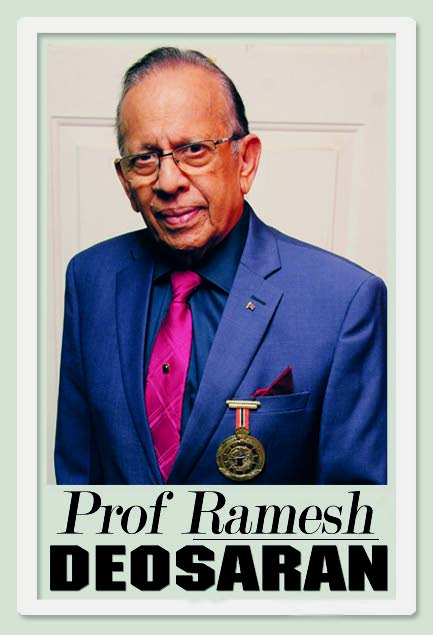Are we culturally trapped?

THERE is a big media war now on directly related to the Russia vs Ukraine and the Israel vs Hamas wars and the Global South initiative, which aims to create a “new world order.”
As global polarisation proceeds, it is helpful for us here to get as much relevant information as possible.
The information war is mainly between news from the “western media” and news from Russia and China’s state-owned media, with each side claiming “propaganda, distortions and lies.”
This information war reminds me of the battle beginning during the 1970s between the developed countries (eg US, Europe) and the developing countries (eg. Africa, Caribbean) for a New World Information and Communication Order (NWICO) which sought to moderate the one-way flow into a more balanced flow of information.
The developing countries strongly felt that their interests and conditions were not properly and fairly represented by the metropolitan media, keeping them trapped in “information imperialism.”
The brightest minds from the developing world, including then Jamaican PM Michael Manley, strenuously fought, but lost. Then cable TV from the developed world entered and we comfortably live with it. Firecracker terms like “cultural imperialism” went to sleep. Our eating, dress, movie habits, etc, fell in line. Our music is still putting up a struggle.
Even our financial system became hooked – a dependency now stoutly tackled by Barbados PM Mia Mottley, backed by St Vincent’s PM Ralph Gonsalves.
So not only has the one-way information flow not changed. it has got more intense, without earlier opposition. Are we culturally trapped?
Of course, this may be nothing to be alarmed about. We appear quite comfortable. I am merely taking a moment from this big-picture issue to show how information flow inspires cultural change.
But it is neither a complete capture nor complete resistance. We remain in between, appreciating if not enjoying both the cultural variations from our travel and porous borders and our own native customs.
I live with it too. Hollywood-style habits and democratic freedoms have become irresistibly seductive. Even Russia, China, Japan, India and the African and Latin American continents get smoothly captured. Is the world really going one way culturally, and another way politically?
About a year ago, when I realised that television broadcasts from RT (Russia Today) and CGTN (China Global Television Network) had been removed from our local cable system, I felt cheated.
Now let me say right away, I am fully aware that these two broadcasting stations come from what we know as communist countries. Also that both are state controlled and funded and naturally provide government-slanted news and information.
Isn’t this true of all state-controlled information outlets? The US forbids any state-owned media, subscribing to the principle of freedom of the press and no censorship.
What is the fear of hearing news from RT an CGTN? Look, I have seen, heard and read enough to know that the ordinary Russians and Chinese are quite similar to us and in fact, far from the belligerent stereotypes projected in the media. They, too, I am sure, would like to know more about us.
It is the politically-driven fears of “the other” that continue to help keep the world on the brink. It is as if an "enemy” has to be discovered or invented to keep political equilibrium. I would like to hear the “propaganda and lies” that RT and CGTN are accused of. I feel capable of judging, and if I detect too much, I will stop listening. Caribbean people would like to know more about Vladimir Putin’s recent proposal to “end the Russia-Ukraine war.” How feasible is the US three-phase proposal to end the Gaza "war”? Can we have information from all sides?
But there is more that connects to the information war. Some 50 countries are joining the BRICS alliance (Brazil, Russia, India, China and South Africa) with a concerted “de-dollarisation” policy. As explained by Dr Busani Ngcaweni, director of South Africa’s National School of Government, this alliance, refusing to remain trapped, seems slowly moving away from the “risks and hegemony" of the US dollar. The planned New Development Bank will help drive the transition.
Part of this momentum is linked to sharp UN opposition to the US’s unconditional financial, military and political support for Israel in its disastrous Gaza war. China and Russia have been on a “winning friends” mission across Africa. The US, seeking to neutralise the effects, has some way to go to restore its credibility in those parts.
It is within this “Global South” mission that CGTN’s feisty and knowledgeable host, Liu Xin, states that part of RT’s role is to “combat western media distortions, propaganda and lies.” US media – Fox, NBC, CBS, ABC – have repeatedly complained of RT and CGTN’s “propaganda and lies” too.
RT’s editor-in-chief, Margarita Simonya, has continuously criticised the “distortions and lies” of “western media. Google, YouTube, DirecTV and several countries have started to cut down on RT’s and CGNT coverage. So it's war on the airwaves too.
The UK’s regulator has revoked RT’s licence. So this information war is really on and we may have to be content with not hearing RT or CGTN – whatever their information worth.

Comments
"Are we culturally trapped?"